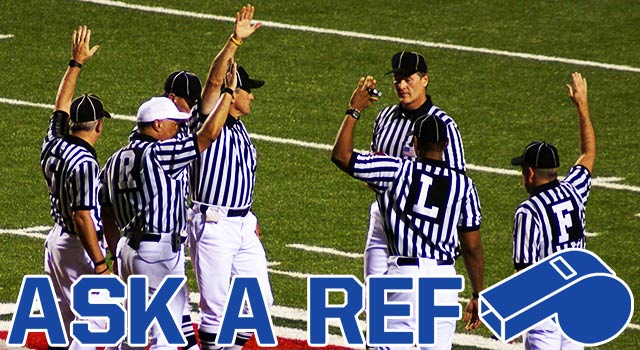
After Further Review Intro
“Hey Ref are you blind?!”
“You must hate our team since we NEVER get any calls!”
How many times have you watched a football game and said those words or been around someone who said them? Come on, you can answer honestly. The advent of fantasy football has made the casual fan more knowledgeable with the X’s and O’s of the game. Next came the wonders of HD television giving us every angle in a crystal clear picture so we can not only play arm chair quarterback, but we can be arm chair officials. Right?
When I was approached to write this column for the Stray Monkey, I looked at it as a great opportunity to help football fans understand officiating. Notice how I used the word understand and not agree. I know from doing games at the high school and collegian level for the past 10 years, you may not agree with what I have to say. No matter how objective you claim you are, I know if you are watching a game involving your favorite team, there will still be a hint of favoritism when that close call does not go your way.
In the coming articles I will explain to you what each officials’ job is on the field, where he lines up, his initial keys during a down, and what his progressions are before and during a down. Also, if you are inclined, I will breakdown plays (or situations) that you the reader email to me (YouTube Videos). Those plays will be included in the mailbag portion of this column and a reasoning why a foul was or was not called will be explained. Those plays can be of any level of football, however, I must warn you that I am not well versed in the NFL rules, but I do know their philosophies on holding and pass interference.
I am not expecting you to agree with what I have to say, and I am always up for a spirited, clean debate. Before I wrap up this first article I will leave you with two myths about officials:
Myth #1: Officials only work 3-4 hours a week which is their game: This could not be further from the truth. Most collegiate and NFL officials put in over 20 hours a week in just preparing for the upcoming game. That preparation includes film review from the previous week, conference calls with their crew to go over the film, rules study, and film preparation of the teams for their next game (much like the scouting an opposing coach would do to breakdown tendencies and formations).
Myth #2: You can call holding on every play: Again this is false. Holding is a very complex philosophy and one that brings a lot of debate. For holding to occur, there has to be a clear advantage by the offense and that advantage must include material restriction. Finally, you must see the entire block from start to finish.
The onus is on the defense to bring attention to the restriction. If an offensive lineman is grasping a defensive lineman and the defense just stands there, there is no advantage/disadvantage, and therefore no holding. If the defender tries to break free and cannot, then you have material restriction and it will be more apparent to the officials. I will go into more detail of this later, but this is just the basics.
With college football already started, and the NFL season kicking off this weekend, you will have a slew of games to watch. Please email me at [email protected] with any questions, plays, or situations so I can discuss them in the column. Enjoy the games!
Yours In Officiating,
After Further Review
About the Author

Guest Author
This article was written by a guest contributor to Stray Monkey.
Share This Article
 Check These Out
Check These Out
Content not available. Please disable site blocker to view.
About Stray Monkey
Stray Monkey is your source for entertainment, travel, and lifestyle content that's a little off the beaten path.
Learn more about us








